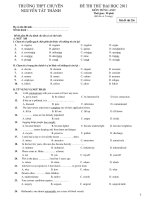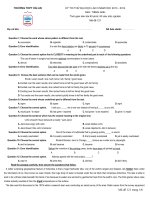- Trang chủ >>
- THPT Quốc Gia >>
- Ngoại Ngữ
THPT NGO GIA TU ĐỀ THI THỬ THPT QUỐC GIA MÔN TIẾNG ANH
Bạn đang xem bản rút gọn của tài liệu. Xem và tải ngay bản đầy đủ của tài liệu tại đây (96.06 KB, 3 trang )
TRƯỜNG THPT NGÔ GIA TỰ
ĐỀ THI THỬ TỐT NGHIỆP NĂM 2013-2014
A.MULTIPLE CHOICE
Choose the word whose underlined part is pronounced differently from the others.
1. A. wondered
B. cleaned
C. replied
D. laughed
2. A. scheme
B. school
C. charity
D. chorus
3. A. another
B. together
C. tomorrow
D. petrol
Choose the word whose main stress is placed differently from the others.
4. A. opponent
B. penalize
C. habitat
D. synchronized
5. A. outstanding
B. vulnerable
C. enthusiast
D. biologist
Choose the best option to complete each of the following sentences.
6. ……. a city map, we wouldn’t have got lost.
A. If we brought B. Had we brought
C. If we hadn’t brought D. Hadn’t we brought
7. ………. we had planned everything carefully, a lot of things went wrong.
A. Although
B. Despite
C. Because
D. Because of
8. No sooner ……………… than the rain came.
A. we had started
B. we started
C. as we started
D. had we started
9. You ……….wash those potatoes. They’ve already been washed.
A. must
B. mustn’t
C. should
D. needn’t
10. I’ve been ………. to the party but unfortunately I can’t go.
A. listened
B. invited
C. explained
D. written
11. Tom has never written to you, ……………?
A. hasn’t he
B. has he
C. hasn’t Tom
D. has Tom
12. ………. is the natural environment in which a plant or animal lives.
A. Extinction
B. Habitat
C. Biodiversity D. Conservation
13. The ………. curriculum is usually set by the government.
A. national
B. nation
C. nationally
D. nationality
14. Is that ……….present Bill gave you for ………. Christmas?
A. a/the
B. the/the
C. the/Ø
D. the/a
15. Mary: “Your new hairstyle is quite attractive!”
Sheila: “……….. I think it makes me look 10 years older.”
A. Yes, I am proud of myself
B. Say it again. I like to hear your words
C. Thank you very much
D. You’ve got to be kidding
16. A person who is at a match to make sure that the rules of the game are obeyed is called a ………….
A. referee
B spectator
C. goalie
D. striker
17. I don’t like extreme sports and ………….
A. so is Tina
B. neither does Tina
C. Tina isn’t either
D. Tina doesn’t too.
18. …………. a happy marriage should be based on love. - I definitely agree!
A. I really know
B. As I see it
C. Personally, I think
D. Do you think
19. The boy got very ……………. when he heard that he would receive the scholarship.
A. exciting
B. excitement
C. excitedly
D. excited
20. Thousands of workers in this factory are now …………. because of the world’s economic situation.
A. employers B. unemployed C. employment D. employees
21. . …………… , the more I like it.
A. The more it is dangerous
C. The more is it dangerous
B. The more dangerous it is
D. The more dangerous is it
22. Our athletes are trying their best ………………..
A. in order they will achieve the best results
B. so as that they will be successful.
C. so that they can win lots of gold medals
D. in order that to defend the SEA Games title.
23. She didn’t succeed in her project ………………………………………….
A. in spite of she tried her best.
B. despite she tried her best.
C. though she didn’t try her best.
D. in spite of the fact that she tried her best.
Choose the sentence which is closest in meaning to the original one
24. Jane can swim further than I can.
A. Jane can’t swim as far as I can.
B. I can’t swim as far as Jane.
C. I can swim as far as Jane.
1
D. Jane can swim as far as I can.
25. People think that he was born in a rich family
A. That is thought he was born in a rich family
B. He was thought to be born in a rich family
C. That he was born in a rich family is thought
D. He is thought to have been born in a rich family
Mark the letter A, B, C or D on your answer sheet to indicate that the underlined part in each sentence needs
correcting.
26. The vacation to Europe will plan carefully before the scheduled departure date.
A. departure date.
B. will plan
C. carefully
D. to
27. Daisy has such many things to do that she has no time to go out.
A. to go
B. to do
C. such
D. has
28. Endangered species are plant and animal species which is in danger of extinction.
A. is
B. extinction
C. danger
D. Endangered
29. The more the relative humidity reading rises, the worst the heat affects us.
A. rises
B. The more
C. affects us
D. the worst
30. All the students in the class are enough good to pass the final exam.
A. to pass
B. enough good
C. the final
D. to pass
Read the following passage carefully and answer the questions that follow.
Women in Britain are better off today than they used to be. At the beginning of the 19 th century, women seem to
have almost no rights at all. They could not vote, or even sign a contract. Their marriages were arranged by their
parents. They were once kept at home and if they were allowed to work, they were never given responsible jobs. It
is strange to think that, as far as we know, most women were happy with that situation.
Today the position is quite different. Women now can vote and choose their own husbands. In 1970, a law was
passed to give them an equal share of property in the case of divorce, and in the same year the Equal Pay Act gave
them the right to get equal payment with men for work of equal value.
Despite these changes, there is no doubt that there are still great differences in status between men and women.
Many employers seem to ignore the Equal Pay Act. It is also more difficult for a woman to get promotion than a man
does.
There is sex distinction in England although it has not been so serious as it was. More and more women go out
to work, earn more money, get high positions in the society, and live independently. However , there are two great
problems to solve. The first problem is men's attitude. They always think that women are lower in rank and are the
weaker sex. We do not know exactly how long it will take them to change their mind. And the other problem which is
much more difficult is women's attitude. They should be ready to struggle to change their fate.
31. At the beginning of the 19th century ,………………….
A. British women were better off than today.
B. Women seemed to have almost no rights at all.
C. British women had the right to vote.
D. British women had the right to choose their husbands.
32. The Equal Pay Act was passed in ………………...
A. 1960
B. 1962
C. 1970
D. 1971
33. Which of these following sentences is NOT TRUE?
A. All the employers in Britain obey the Equal Pay Act.
B. In 1970, a law was passed to give British women the right to share property equally in the case of
divorce.
C. The Equal Pay Act gave British women the right to get equal payment with men for work of equal value.
D. Women cannot get promotion as equal as men.
34. What is men's attitude?
A. They consider women to be equal to them.
B. B. They always look up women.
C. They consider women the stronger sex.
D. D. They consider women the weaker sex.
35. What should women do to eliminate sex distinction?
A. They should suffer with pleasure.
B. They should struggle to change their fate.
C. They should earn more money.
D. All are correct
Fill in each numbered blank with ONE suitable word:
Nonverbal communication, or "body language", is communication by facial expressions, head or eyes
movements, hand signals, and body postures. It can be just as important to understand……..(36) words are.
Misunderstandings- often amusing………. (37) sometimes serious- can arise between people from different
cultures if they misinterpret nonverbal signals. For example, take the differences in meaning of a gesture……….
(38) is very common in the United States: a circle made with the thumb and index finger. To an American, it
means that everything……….(39) OK. To Japanese, it means that you are talking ………. (30) money. In
2
France, it means that something is worthless. Meanwhile in Greece, it is an obscene gesture. Therefore, an
American could unknowingly offend a Greek by using that particular hand signal.
36. A. as
B. than
C. more
D. less
37. A. although
B. but
C. unless
D. in order to
38. A. who
B. where
C. why
D. that
39. A. is
B. are
C. were
D. was
40. A. around
B. about
C. among
D. ahead
The end
ANSWER KEY
1.D
6.B
11.B
16.A
21.B
26.B
31.B
36.A
2.C
7.A
12.B
17.B
22.C
27.C
32.C
37.B
3.A
8.D
13.A
18.C
23.D
28.A
33.A
38.D
4.A
9. D
14.C
19.D
24.B
29.D
34.D
39.A
5.B
10. B
15.D
10.B
25.D
30.B
35.B
40.B
B. WRITING
1. They spend half an hour watching the news on TV every day.
→ It takes____________________________________________________________________________________
2. John didn’t buy the shirt because she didn’t have enough money.
→ If John____________________________________________________________________________________
3. Because the traffic is heavy, I sometimes come to my office late.
→ Because of ________________________________________________________________________________
4. The child is living with his aunt. His parents died in the air crash.
→ The child__________________________________________________________________________________
5. The last time I saw Dick was in 1985.
→ I haven’t __________________________________________________________________________________
6. Tom asked John, “Where did you go last night ?”
→Tom asked_________________________________________________________________________________
7. Nobody can solve this problem.
→ This problem_______________________________________________________________________________
8. The plumber repaired the leak this morning.
→ They had _________________________________________________________________________________
The end
ANSWER KEY
1. It takes them half an hour to watch the news on TV every day.
2. If John had had enough money, he would have bought the shirt.
3. Because of the heavy traffic, I sometimes come to my office late.
4. The child whose parents died in the air crash is living with his aunt.
5. I haven’t seen Dick since 1985.
6. Tom asked John where he had gone the night before/the previous night.
7. This problem cannot be solved.
8. They had the plumber repair the leak this morning.
3









